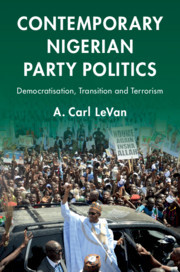Contemporary Nigerian Politics Competition in a Time of Transition and Terror
Langue : Anglais
Auteur : LeVan A. Carl

Looks at how Nigeria's political parties compete for power in a context of transition, terrorism, and religious and ethnic tension.
In 2015, Nigeria's voters cast out the ruling People's Democratic Party (PDP). Here, A. Carl LeVan traces the political vulnerability of Africa's largest party in the face of elite bargains that facilitated a democratic transition in 1999. These 'pacts' enabled electoral competition but ultimately undermined the party's coherence. LeVan also crucially examines the four critical barriers to Nigeria's democratic consolidation: the terrorism of Boko Haram in the northeast, threats of Igbo secession in the southeast, lingering ethnic resentments and rebellions in the Niger Delta, and farmer-pastoralist conflicts. While the PDP unsuccessfully stoked fears about the opposition's ability to stop Boko Haram's terrorism, the opposition built a winning electoral coalition on economic growth, anti-corruption, and electoral integrity. Drawing on extensive interviews with a number of politicians and generals and civilians and voters, he argues that electoral accountability is essential but insufficient for resolving the representational, distributional, and cultural components of these challenges.
1. Introduction; 2. The end of a new beginning: Nigeria's transition, 1999–2015; 3. The rational counterterrorist? Economic policy and insurgent insecurity in Nigeria's 2015 presidential campaign; 4. Voting against violence? Economic uncertainty and physical insecurity in 2015; 5. Electoral integrity, ethnic affinity and religious revival in Nigeria's party turnover; 6. Subnational subversion and institutional stress; 7. Conclusion.
A. Carl LeVan is Associate Professor at the American University in Washington, DC. His is the author of Dictators and Democracy in African Development: The Political Economy of Good Governance in Nigeria (Cambridge, 2015), co-editor of The Oxford Handbook of Nigerian Politics (2018), as well as various articles on Boko Haram, civil society, Abuja's development, and authoritarianism. He also worked as a technical trainer for Nigeria's National Assembly during the 1999 transition. LeVan's other publications include the co-authored Constituents before Assembly (Cambridge, 2017), which demonstrates the benefits of participatory constitution-making worldwide. He has published articles on power-sharing, constitution-making, African cabinet size, and the US military in Africa.
Date de parution : 01-2019
Ouvrage de 300 p.
15.1x22.8 cm
Date de parution : 01-2019
Ouvrage de 300 p.
15.6x23.5 cm
Thème de Contemporary Nigerian Politics :
© 2024 LAVOISIER S.A.S.



